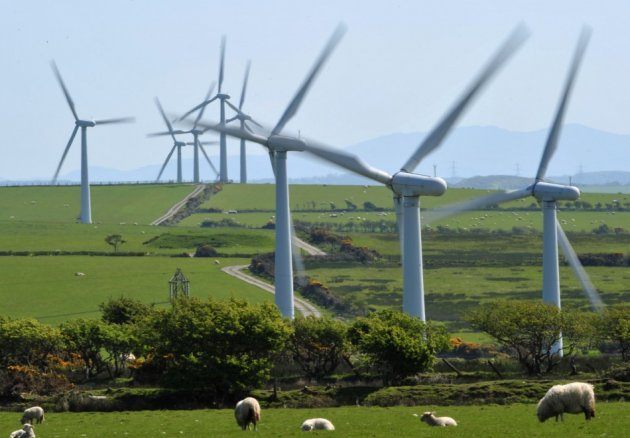The UK wind farm industry has threatened the government with legal action if subsidies for renewable energy are pulled. Yesterday, a prominent renewables lawyer took to the Guardian to warn against the “wilful destruction” of the wind farm industry. His voice has now been joined by other industry experts threatening court action if wind farm projects are threatened.
In an eyebrow-raising polemic, Marcus Trinick QC, a partner at Eversheds LLP and member of industry body RenewableUK, yesterday launched a broadside at “rabid” and “pitchfork” waving Tories who are driven only by “a visceral hatred of the appearance of wind turbines” in their quest to bring about nothing less than the “wilful destruction of an industry.”
He claims that “this unrepresentative minority” forced the Conservative Party to act irrationally by including a pledge in its manifesto to end all on-shore wind farm subsidies by 2017, and implies that this alone may be enough to provoke legal action from the renewables industry, thanks to the promise creating an element of market instability.
But a source inside the Department of Energy and Climate Change has now suggested that the Renewable Obligation (RO) subsidy system may be brought to an end in April 2016, rather than April 2017 as promised in the manifesto.
“Please be aware of the dangers of [EU] state aid discrimination and look at what is happening in international energy arbitration across Europe. In such a position we could not afford not to fight, especially if action is taken to interfere retrospectively.” Mr Trinick warns.
He has been joined in his fight by Maf Smith, deputy chief executive of RenewableUK, who warned: “The industry will fight against any attempts to bring in drastic and unfair changes utilising the full range of options open, including legal means if appropriate,” the Guardian has reported.
And Dr Rob Gross, an energy expert at Imperial College, has told the Guardian he believed it was not fair to suggest that too much public money was being handed to onshore wind, saying: “I think this is mainly about the manifesto commitment and being seen to do something to curtail the development of onshore wind. It’s primarily a politically-motivated change.”
In 2012/13 the government handed out more than £1.2 billion to turbine owners, according to a Telegraph report. But a recent report shows that the energy secretary of the time, renewables fanatic Ed Davey, gave the go-ahead to far more renewables project than are required to meet legal targets on renewable energy generation.
That hasn’t stopped industry insiders warning that projects may not be able to complete if subsidies are withdrawn – exactly what is needed if current energy secretary Amber Rudd isn’t to be faced with a whopping £1.5 bn a year bill in unfunded subsidy payments.
Ian Marchant, chairman of Infinis Energy Plc warned “If the RO is terminated early without reasonable grace periods in place, not a single energy or large scale infrastructure project in the UK will be safe going forward.”
When the Renewables Obligation system comes to and end, either in 2016 or 2017, it will be replaced with a new scheme called Contracts for Difference. Onshore windfarms will have to bid for subsidy under that scheme, but there are suggestions that onshore wind may not be eligible.
Bloomberg Energy Finance has calculated that if it is not eligible, fewer than half of the onshore wind projects currently in the advanced stages of planning would receive subsidies.
In a statement, Ms Rudd said: “We promised people clean, affordable and secure energy supplies and that’s what I’m going to deliver. We’ll focus support on renewables when they’re starting up – getting a good deal for billpayers is the top priority.”
A Decc spokeswoman has added: “It’s premature to talk about retrospective changes [to the subsidy system].”

COMMENTS
Please let us know if you're having issues with commenting.